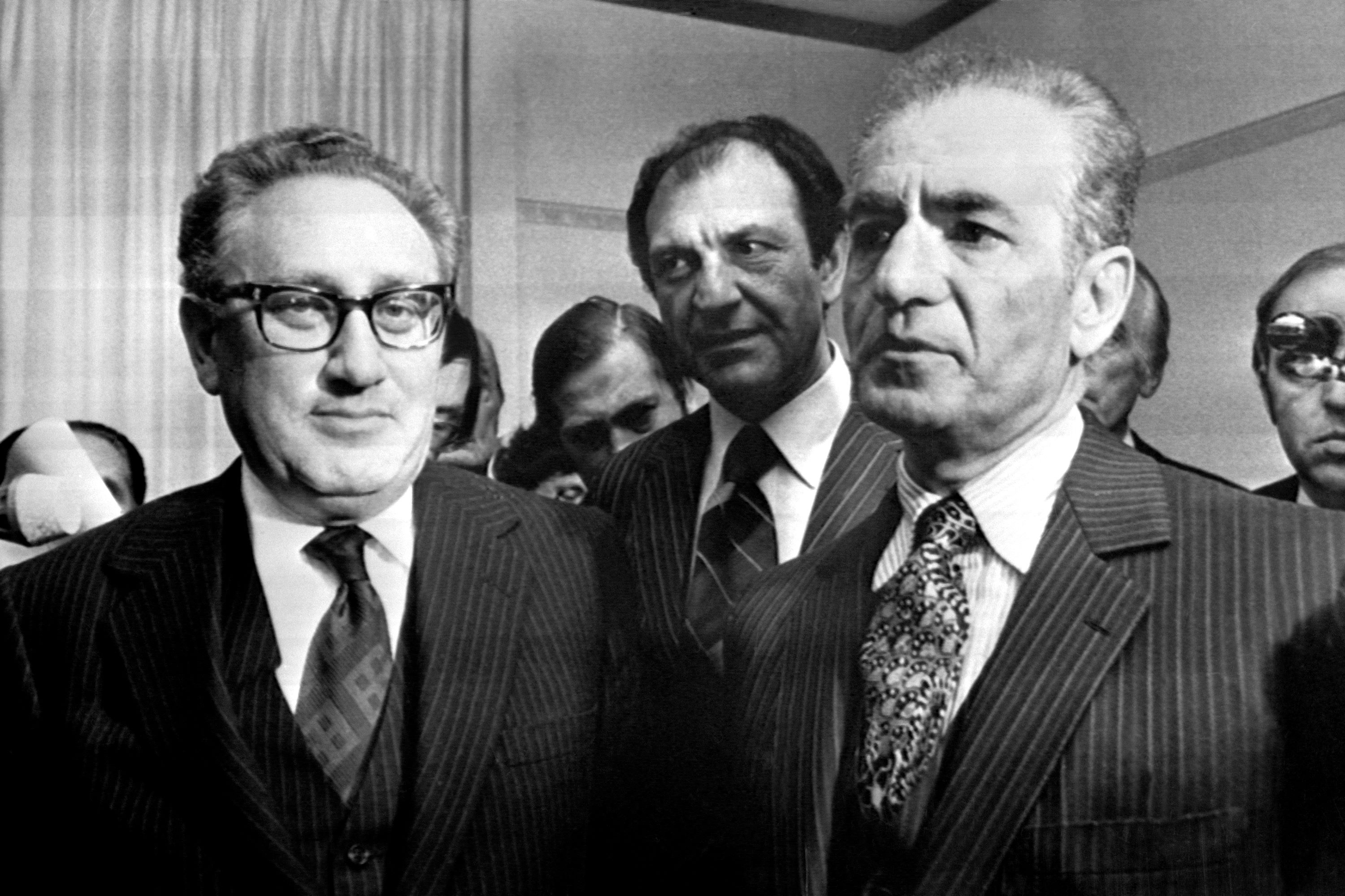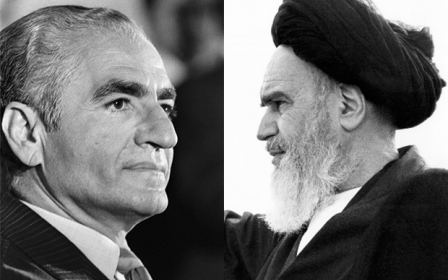Henry Kissinger: His legacy in the Middle East and North Africa

Few individuals have left such a mark on world history in the 20th century as Henry Kissinger.
His death on Wednesday at the age of 100 led to a flurry of predictable responses. While world leaders and diplomats praised him as a statesman and a negotiator, many others highlighted his bloody legacy across Asia and Latin America, where his uncompromising war on communism left millions dead and millions more under the heel of brutal dictatorships.
When it comes to the Middle East, his legacy is no less significant.
In the West, he is perhaps best remembered for his role in negotiating the Camp David Accords in the late 1970s that saw Egypt become the first Arab state to recognise Israel, an agreement that has lasted to the present day.
For many others, however, he was a key figure in upholding a range of tyrannical governments in the region - while Palestinians may never forgive him for ignoring their needs and rights during the Camp David negotiations.
Stay informed with MEE's newsletters
Sign up to get the latest alerts, insights and analysis, starting with Turkey Unpacked
Middle East Eye takes a look at some of Kissinger's key actions and thoughts on the Middle East.
Camp David Accords
Kissinger's involvement in negotiating the first recognition agreement between an Arab country and Israel is, unarguably, the Middle Eastern achievement for which he will be most remembered.
In the wake of the 1973 war between Israel and its neighbours, Egyptian President Anwar Sadat repositioned his country and its economy away from the non-aligned and socialist policies of his predecessor, Gamal Abdel Nasser, in favour of a pro-western outlook and free market policies.
A key plank of this new move would be pushing for a peace deal with Israel that would also see the latter return the Sinai Peninsula - occupied by Israel in 1967 - to Egyptian control.
Following 12 days of negotiations at Camp David in the US, the accords were signed on 17 September 1978, with well-publicised photos of Israeli Prime Minister Menachem Begin and Sadat shaking hands, an image that seemed to herald a new era for the region.
Of course, it was not - and is still not - seen that way by many others. The Palestinians were mostly ignored in the negotiations, and no other Arab state would follow Egypt's example until the 90s.
Kissinger's "shuttle diplomacy", as it was branded, began in the aftermath of the October 1973 war and saw him travel back and forth between Arab and Israeli leaders to try to thrash out a new order between groups previously seen as implacable enemies.
Fundamentally, Kissinger was staunchly pro-Israel and saw securing Israeli security as a primary goal in the Middle East, famously declaring in 1977 that the "security of Israel is a moral imperative for all free peoples".
At the same time, he also held some seemingly contradictory views in private, particularly when it came to preventing the spread of communism, which was arguably his number one concern in all spheres of conflict.
"The best defence against the spread of communism in the Arab world is to strengthen the moderate Arab governments," he said during a meeting with Jewish leaders in New York in 1975.
'[Kissinger] did more than most to demonise the Palestine Liberation Organization and hamper the settlement of the Palestinian issue'
– Bassam Abu Sharif, PLO
"So it is difficult to claim that a strong Israel serves American interests because it prevents the spread of communism in the Arab world. lt does not. It provides for the survival of Israel. This was our perception in October of 1973."
Bringing Egypt into the pro-western camp not only provided for Israel's security, but also broke Egypt's previously strong ties with the Soviet Union and opened up the country for foreign investment.
At that same 1975 meeting, Kissinger stated that US policy was to "enhance Israel’s strategic capacity in the region, consolidate friendly Arab regimes, and to isolate and debilitate the Palestinian movement".
His opposition to Palestinian self-determination would persist. In 1988, according to the New York Times, he privately urged the Israelis to "bar television cameras and reporters from the occupied territories as part of its effort to put down violent protests" after the beginning of the First Intifada.
Palestine Liberation Organization (PLO) official Bassam Abu Sharif would later say he "did more than most to demonise the Palestine Liberation Organization and hamper the settlement of the Palestinian issue".
Turkey and the invasion of Cyprus
On 15 July 1974, the military government of Greece staged a coup in Cyprus that removed the elected president and replaced him with a puppet ruler, in an attempt to force through a union between the two countries.
Inter-communal violence between Cypriot Turks and Greeks had been ongoing for some time, and five days after the coup, Turkey invaded Cyprus and captured the north of the island, ostensibly in a bid to protect the Turkish communities and prevent the union with Greece.
'There is no American reason why the Turks should not have one-third of Cyprus'
– Kissinger to US President Gerald Ford, August 1974
That situation, which led to the displacement of tens of thousands of people from both communities, remains unchanged to this day, with northern Cyprus ruled by a self-declared statelet recognised only by Turkey.
As US Secretary of State, Kissinger was a staunch supporter of Turkey over the issue. In a discussion with then Prime Minister Bulent Ecevit (who had been a former student of Kissinger's at Harvard), he reportedly greenlit Turkey's invasion.
“There is no American reason why the Turks should not have one-third of Cyprus,” Kissinger told President Gerald Ford only a few days after Ford became president in August 1974.
“The Turkish tactics are right - grab what they want and then negotiate on the basis of possession."
Kissinger remained a firm ally of Turkey for decades, telling Prime Minister Suleyman Demirel approvingly in 1991 that, after the fall of the Soviet Union, he saw "a whole Turkic world from the Adriatic to the Great Wall of China standing up”.
Iran: from key ally to implacable enemy
Until 1979, Shah Mohammad Reza Pahlavi of Iran was one of the US's key allies in the Middle East.
Despite repeated reports of human rights abuses - he was once described by Amnesty International as having "the worst record of political repression in the world" - Kissinger and his allies saw the shah as a pillar of stability.
Writing for the Washington Post in 1979, following the monarch's overthrow in the Islamic Revolution, Kissinger said that "in my own experience the shah never failed to stand by us" and praised him for not joining the 1973 oil embargo sparked off by the Arab states' war with Israel that year.
"The shah was a source of assistance and encouragement to the forces of moderation in the Middle East, Africa and Asia - he used his own military power to ensure the security of the Persian Gulf and to discourage adventures by radicals," wrote Kissinger.
In the article he advocated giving the Shah safe haven in the US, after the ruler fled in the wake of the revolution.
"I reaffirm my support for the effort to assure a measure of decency toward a fallen friend of this country. The issue of the shah’s asylum goes not only to the moral stature of our nation but also to our ability to elicit trust and support among other nations - especially other moderate regimes in the area."
His view on the subsequent Islamic Republic of Iran was decidedly less sympathetic.
In 2014, he described the Islamic Republic as a "bigger problem" than Islamic State, suggesting they had a plan to "reconstruct the ancient Persian Empire, this time under the Shia label".
He was to the end vehemently opposed to the 2015 nuclear deal agreed with the country, warning in 2022 that any discussion of a return to the deal (scuppered by Donald Trump) would be "very dangerous".
'No position' on Western Sahara
In a discussion with Algerian ruler Houari Boumediene in October 1974, Kissinger said that while he theoretically supported "self-determination" for the people of the then-Spanish controlled Western Sahara, he didn't think it was possible.
"I’m for it, but I don’t think it’s natural for an entity so accidentally formed. So the only question is what country exerts a dominating influence," he said.
He said the US would have "no position" on the fate of the region, which would eventually become embroiled in a decades-long national liberation conflict and Moroccan annexation.
"I want it to go away! I can’t get excited about 40,000 people who probably don’t know they’re living in Spanish Sahara," Kissinger told Boumediene.
Black September in Jordan
In 1970, a variety of left-wing Palestinian groups attempted to carry out an uprising against Jordan's King Hussein.
The uprising, later known as Black September, provoked alarm in the US, not just over the potential threat to Israel and their Jordanian ally, but due to the participation in the uprising of groups sympathetic to the Soviet Union.
American air and naval forces were put on alert and Kissinger managed to pressure President Richard Nixon into signing off on a plan for Israeli intervention in Jordan - which at that time did not recognise its western neighbour - to prevent Hussein's overthrow, a situation exacerbated by the incursion of Syrian troops into northern Jordan in support of the Palestinians.
While Israeli involvement was eventually limited, the repression of the uprising left thousands dead and saw Palestinian armed groups forced into Lebanon, a situation which would help spark off the Lebanese civil war just a few years later.
Middle East Eye delivers independent and unrivalled coverage and analysis of the Middle East, North Africa and beyond. To learn more about republishing this content and the associated fees, please fill out this form. More about MEE can be found here.






